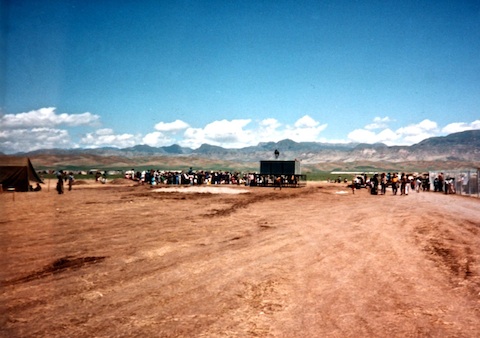The Kurdish Detour
Zakho, Iraq—The meeting allowed members to express serious concerns regarding their future deployment. They were mostly concerned that higher authorities were disregarding the mental and physical strain of running two large camps and that the command might be planning an indefinitely long deployment of the 432nd without considering rotating the unit with other civil affairs companies which had not been used during the Gulf crisis. The commander attempted to alleviate fears of an indefinite deployment by demonstrating how much of the unit’s mission was completed at that date, permitting an imminent handoff of the camp to civilian agencies and the unit’s redeployment to the US. Nine days later, on Thursday, May 23rd, the unit received warning orders releasing the unit from duty in northern Iraq between June 4-6. The troops finally had their date for the beginning of redeployment.

By May 23rd it was evident that the job of the 432nd had been well done: in the mountains, civilian deaths had dropped from about 2,000 per day to about 100 per day, a close-to-average figure for a population of over 2 million. Down in the valley, the 432nd was now coordinating the life of two camps totalling a combined population of nearly 40,000 people. And best of all, the highways out of the valley began filling with vehicles returning refugees to their homes in the region.
The question that remained in the minds of the troops as they began to leave the valley for the US concerned the future. What will happen to these children, the wide-eyed “hello birds” who constantly swarmed around “mister” GI? What will happen to the women, most often remembered balancing water containers on their shoulders or kneeling before fires preparing meals? What will happen to the men, who will never be forgotten in a multitude of jobs they performed for the soldiers: In food distribution; supply areas; night security; and, perhaps most demanding of all, as interpreters. They will be remembered as a multitude of faces and no longer a generic name in newspapers, the Kurds. They will be remembered as people, with whom members of the 432nd have shared intense and unforgetttable memories.
McMurry’s Notes
-
- May 31 letter home
- “Provide Comfort Leader Pleased by Pace of Kurdish Resettlement”, Stars & Stripes
- That mental and physical strain boiled over on May 21, resulting in the “Mother of All Bonfires”. Bottles of every imaginable booze were passed around and many cans of Efes Beer from Turkey were consumed. What began as a small drinking party soon got out of hand. The massive bonfire the Aggies have at Texas A&M before the football game with Texas was a spark compared to this one. Everything went into it: pallets; bras; truck tires; Lieutenant Howie Larsen’s Playboy magazines; cots; and Howie’s underwear (after he’d been forcibly stripped in front of the whole party — including female enlisted and officers).
(Upon further review, the fire was nowhere near as big as Texas A&M’s, but it sure seemed like it at the time.)
Even a lieutenant colonel’s beret was immolated. The colonel had been driving by on the highway and had stopped to see what all the commotion was about. Seeing the refreshments, he helped himself. He basically crashed our party. I was drinking next to Major “Fighting” Bob Johanson, our S-3, when this came to our attention. It further came to our attention that the colonel was wearing a maroon beret. First, being airborne I’ve always had a beef with legs who are allowed to wear a beret merely because they happen to be in a unit that is airborne. Second, if a unit is airborne in name, but not on jump status, no one — not even airborne qualified personnel — is authorized to wear a beret. Third, berets are not supposed to be worn in the field. Major Johanson suggested that I do something about this affront, and so being the high speed lieutenant I was, I did. I snuck outside the drinking circle, outside the glow of the fire. Then in one mad dash through the crowd, I grabbed the colonel’s beret, flung it in the fire, and kept running. (I later heard that they even heard about the beret incident at some headquarters in Germany.)The bonfire eventually grew so high that some MPs from a camp a mile away came out to investigate. One of the enlisted guys was a lawyer in civilian life. When he tried his lawyer shtick on the MPs, they put him in an arm bar, slamming him up against the hood of their vehicle. After one of the higher-ranking officers explained to the MPS that for their own safety they shouldn’t mess with us, they left.
432nd Civil Affairs, Operation Provide Comfort from Preston McMurry on Vimeo.
| Page 28 | Page 29 | Page 30 |
